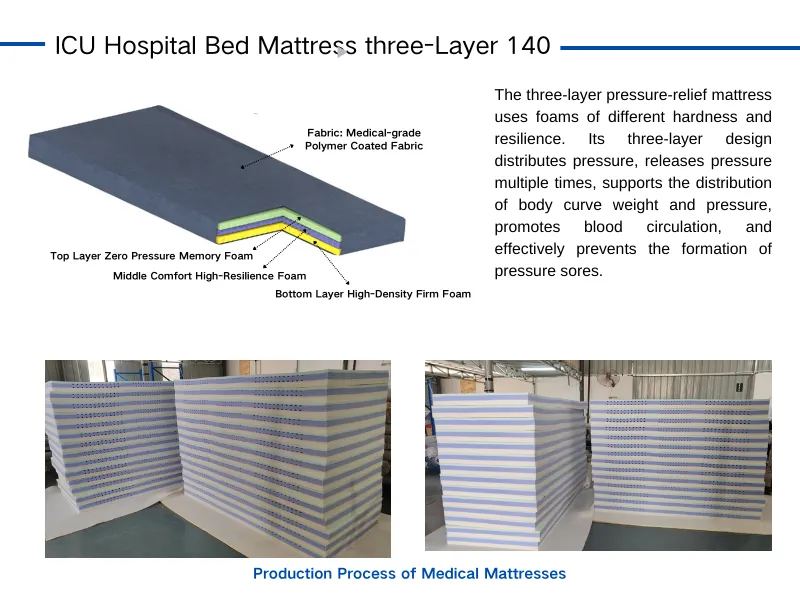best medical mattress for bed sores
Finding the Best Medical Mattress for Bed Sores
Bed sores, also known as pressure ulcers or decubitus ulcers, are a serious health concern for individuals with limited mobility. These painful sores can develop when sustained pressure cuts off blood flow to certain areas of the skin, typically over bony prominences. For patients who are bedridden or use a wheelchair, selecting the right mattress can play a crucial role in preventing these sores. In this article, we will explore the best medical mattresses designed specifically to combat bed sores and enhance patient comfort.
Understanding Bed Sores
Before delving into mattress options, it's essential to understand what bed sores are and how they develop. Bed sores occur in stages, starting from redness of the skin and progressing to open wounds if not addressed promptly. The most common locations for bed sores include the heels, elbows, hips, and lower back.
Several factors contribute to the formation of bed sores, including pressure, moisture, friction, and shear. Therefore, a mattress designed for patients at risk of bed sores must address these factors effectively.
Types of Medical Mattresses
1. Foam Mattresses Foam mattresses are dense and offer a good balance of support and pressure relief. Memory foam, in particular, contours to the body, helping to distribute weight evenly and reduce pressure points. Look for high-density memory foam options that maintain their supportive properties over time. Some advanced models also incorporate cooling gel layers to keep the surface temperature comfortable.
2. Alternating Pressure Mattresses These mattresses feature a pump that periodically inflates and deflates air chambers within the mattress. This constant change in pressure stimulates blood flow and significantly reduces the risk of bed sores. Alternating pressure mattresses are especially beneficial for patients in long-term care settings or those with severe mobility issues. They are often used in hospitals and are considered one of the most effective options for pressure sore prevention.
3. Low Air Loss Mattresses Low air loss mattresses are designed to provide pressure relief while keeping the skin dry. They incorporate a series of air-filled chambers and a constant flow of air that reduces moisture buildup, which is a significant risk factor for bed sores. These mattresses help manage temperature and moisture, ensuring that skin integrity is maintained. They are ideal for patients with existing sores or those at a high risk of developing them.
best medical mattress for bed sores

4. Hybrid Mattresses Hybrid mattresses combine materials and features from both foam and air technologies. They often include a foam base with an air-filled top layer for adjustable pressure relief. These mattresses can cater to a wide range of patient preferences and needs, making them versatile options in clinical settings.
Features to Look for in a Medical Mattress
When selecting a mattress for bed sore prevention, consider the following features
- Pressure Redistribution Look for mattresses that promote even weight distribution and relieve pressure at critical points. - Water Resistance A waterproof cover can help protect the mattress and make it easier to clean, which is an important factor for hygiene.
- Ease of Use If care staff will be regularly adjusting the mattress, consider models that are straightforward to operate.
- Durability A high-quality mattress is an investment in comfort and health, so look for models with warranties that indicate durability.
Conclusion
Choosing the best medical mattress for bed sores is a critical decision that can significantly impact a patient’s comfort and recovery. With options ranging from foam mattresses to advanced air-based systems, caregivers must assess individual needs, mobility levels, and existing health conditions. Investing in the right mattress not only helps prevent bed sores but also enhances overall quality of life for those at risk. Remember to consult with healthcare professionals for tailored recommendations based on specific patient needs. Ultimately, the right mattress can make a world of difference in the battle against bed sores, contributing to better health outcomes and improved patient experiences.
-
Mattresses Designed for Back Pain ReliefNewsAug.08,2025
-
Innovative Wave Mattresses for Ultimate ComfortNewsAug.08,2025
-
High-Quality Mattresses for Hospital BedsNewsAug.08,2025
-
High-Quality Mattresses for Every NeedNewsAug.08,2025
-
Healthcare Foam Mattress: Sleep Better, Heal FasterNewsAug.08,2025
-
Cube Mattress for Daily ComfortNewsAug.08,2025
-
How Hospital Mattress Choices Directly Impact Patient Comfort and CareNewsAug.05,2025

